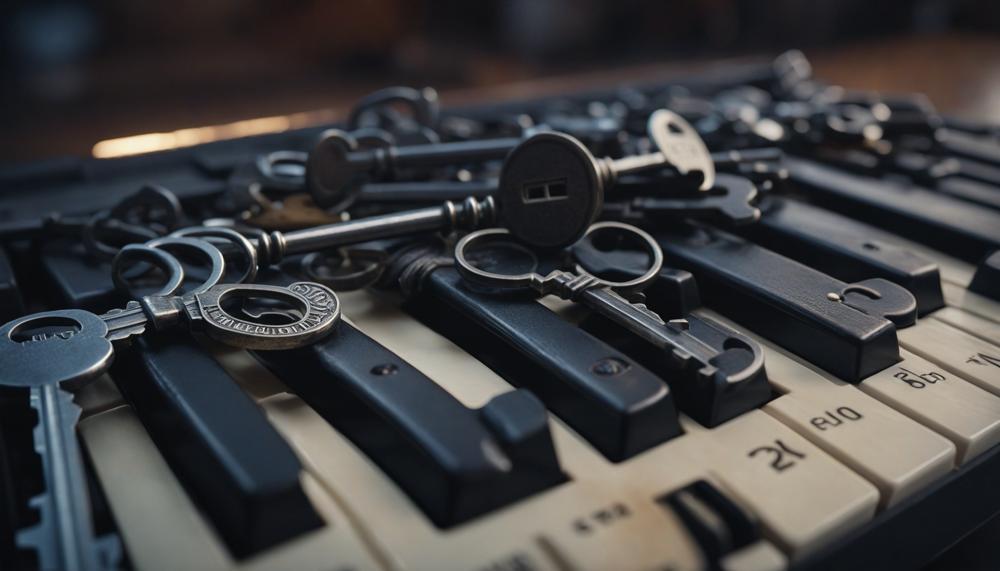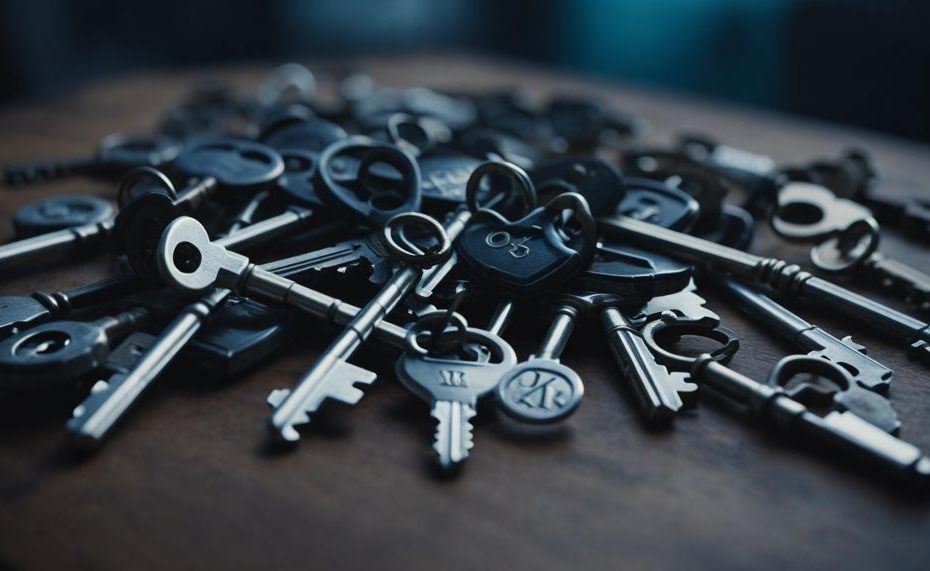Have you ever found yourself with a collection of old keys, unsure of what to do with them? You’re not alone. Properly disposing of old keys is more important than you might think, and it’s not just about decluttering your drawer.
Keys can pose a security risk if they fall into the wrong hands and they’re also an environmental hazard if not disposed of correctly. Here’s the lowdown on how to handle those metal remnants responsibly.
Key Takeaways:
- Security Risks: Old keys can be used to access your home, car, or personal belongings if found by the wrong person.
- Environmental Impact: Keys are made of metal that can take centuries to decompose, releasing harmful chemicals in the process.
- Responsible Disposal Methods:
- Recycle: Drop them off at a recycling center.
- Return: Give them back to landlords or property owners if they’re spare keys.
- Donate: Contribute to scrap metal charities.
- Household Waste: As a last resort, throw them out with your household trash, but make sure to render them unusable first.
By following these steps, you’re not only protecting your security but also contributing to a healthier environment. Ready to dive into the details? Let’s explore how you can make disposing of old keys a safer, greener process.
Contents
Can You Recycle Keys?
The most environmentally-friendly way to dispose of old keys is to recycle them. Keys are typically made of metals like brass, aluminum, and steel, which can be melted down and repurposed into new products. This process conserves resources and reduces the energy required compared to producing new metal. Here’s a detailed breakdown of your options:
| Method | Description | Environmental Impact |
| Recycling | Drop your keys off at a local recycling center that accepts metal items. Verify with your local facility for specific guidelines. | High – Conserves resources, reduces waste and energy consumption. |
| Scrap Metal Yards | Donate your keys to a scrap metal yard, which will recycle the metal and may offer a small payment in return. | High – Ensures the metal is recycled and reused effectively. |
| Take-Back Programs | Some manufacturers, like KeySmart, offer programs to send back old keys for recycling, often with incentives like discounts. | High – Facilitates easy recycling and promotes sustainable practices. |
| Repurposing | Convert old keys into jewellery, decor, or art projects. | Moderate – Keeps keys out of landfills and provides creative reuse. |
| Trash (Last Resort) | Dispose of keys in the trash if no other options are available. Ensure they are not mixed with other recyclables. | Low – Adds to landfill waste but better than letting them sit unused. |
What Type of Keys Cannot Be Recycled?
There are several types of keys that cannot be recycled due to the materials they contain or their potential environmental impact. Here are some examples:
| Type of Key | Reason for Non-Recyclability | Proper Disposal Method |
| Transponder Keys | Contain electronic chips made of lead, nickel, and copper, along with batteries that can leak harmful chemicals. | Dispose of at an e-waste recycling facility or through a dedicated battery disposal program. |
| Smart Keys | Include electronic components and lithium batteries, which can cause fires and environmental damage. | Return to the manufacturer for safe disposal or take to an e-waste recycling centre. |
| Skeleton Keys | Often contain toxic materials like lead in their design or coating. | Handle as hazardous waste and consult local guidelines for safe disposal. |
| Antique Keys | May contain harmful materials or have historical value that warrants special handling. | Consider donating to a museum or disposing of as hazardous waste. |
| Decorative Keys | Could be coated with toxic substances that are harmful to the environment. | Dispose of in accordance with hazardous waste regulations. |
How Do You Recycle Keys?
Keys, mostly made of metal, can be recycled in various eco-friendly ways to prevent them from ending up in landfills. Here are some practical methods to recycle old keys:
| Method | Description | Details |
| Local Recycling Centres | Drop keys at designated centres | Check local guidelines |
| Curbside Recycling Programmes | Include keys in recycling bin | Confirm acceptance |
| Mail-in Recycling Programmes | Send keys via mail | Use services like TerraCycle |
| Art and Craft Projects | Repurpose for creative use | Search for DIY ideas |
| Donations to Charities | Donate for fundraising | Contact local charities |
| Gift or Reuse | Give to family or friends | Use in handmade gifts |
| Specialized Recycling Events | Participate in community events | Stay informed locally |
By implementing these methods, you not only recycle old keys responsibly but also contribute to environmental conservation.
Can You Put Them in the Trash?
Yes, it is generally safe to dispose of old keys in the regular trash. However, there are several factors to consider:
| Type of Key | Disposal Method | Notes |
| Metal Keys | Recycle | Take to a recycling center or scrap metal facility. |
| Plastic or Non-Metal Keys | Regular Trash | Ensure no personal information is attached. |
| Small/Thin Keys | Regular Trash | Wrap in paper or tape to prevent injuries. |
| Large Quantity of Keys | Donate | Consider donating to charities or for art projects. |
Why Recycle Keys?
Recycling keys offers several advantages that go beyond just reducing waste. Here’s why recycling your old keys is beneficial:
Environmental Impact:
Recycling old or unused keys significantly reduces waste and lessens our environmental footprint. Keys contribute to a notable portion of metal waste in landfills, and by recycling them, we can prevent pollution and conserve precious natural resources.
Energy Conservation:
By recycling metals like copper and brass found in keys, we save energy that would otherwise be spent mining and processing new metals.
This energy saving also translates to a reduction in greenhouse gas emissions.
Economic Benefits:
Metals obtained from old keys can be sold to manufacturers, providing an economic benefit. This process supports the recycling industry and encourages the circular economy.
Decluttering Homes:
Recycling keys helps declutter our living spaces, freeing up valuable storage and making our homes more organized.
Sustainable Lifestyle:
Adopting small changes like recycling keys contributes to a broader goal of sustainability. Every action towards a more eco-friendly lifestyle can have a positive ripple effect.
Can You Do Anything Else With the Old Keys?
Absolutely. Old keys can be repurposed in various creative and eco-friendly ways, adding both functionality and aesthetic value to your home while reducing waste. Here are some inventive ideas:
| Project | Description | Instructions/Link |
| Key Wind Chimes | Transform your old keys into a melodic wind chime. This project adds a whimsical touch to your garden or balcony. | String the keys on fishing line or thin wire and attach them to a sturdy base, like a piece of driftwood or a metal hoop. |
| Key Hooks | Use keys to create unique and practical hooks for hanging keys, jewellery, or other small items. | Bend the keys slightly, drill a hole at the top, and screw them into a wooden board or directly onto a wall. |
| Key Jewellery | Fashion old keys into stylish necklaces, bracelets, or earrings. | Attach the keys to chains or earring hooks. You can add beads or charms for extra flair. |
| Key Art | Create a piece of wall art using keys arranged in a pattern or shape. | Glue keys onto a canvas or wooden board in a design of your choice. Paint over them for a cohesive look. |
| Christmas Ornaments | Turn keys into charming Christmas tree decorations. | Paint the keys in festive colours, add some glitter, and tie a ribbon through the hole for hanging. |
| Plumb Bob | Repurpose a key as a plumb bob for construction or DIY projects. | Simply tie a string to the key and use it to find a vertical reference line. |
| Curtain Weights | Use keys as weights to keep curtains hanging properly. | Sew the keys into the bottom hem of your curtains. |
| Tablecloth Weights | Prevent tablecloths from blowing away by attaching keys as weights. | Clip the keys to the edges of your tablecloth using binder clips or small clamps. |
For more ideas and detailed instructions, you can check out resources like Pinterest or DIY blogs that offer step-by-step guides.
The Environmental Benefits of Recycling Keys
Recycling keys offers several significant environmental advantages, contributing to sustainable waste management. By turning old keys into new products, we minimise the waste that ends up in landfills, thereby reducing soil and water pollution.
This practice is essential for conserving natural resources and curbing the detrimental effects of metal extraction and processing.
Environmental Benefits of Recycling Keys:

- Reduces Landfill Waste: Recycling keys diminishes the volume of waste in landfills. Metals like those in keys do not decompose easily, leading to long-term pollution. Reducing landfill waste mitigates the release of harmful substances into the environment.
- Conserves Natural Resources: Keys are typically made from metals such as brass or steel. Recycling these metals cuts down on the need for raw material extraction, preserving natural habitats and reducing the ecological impact of mining activities. For more information on the importance of recycling metals, see this Wikipedia article on metals recycling.
- Saves Energy: Recycling metals uses significantly less energy compared to producing new metals from raw materials. According to EPA, recycling aluminium, for example, saves up to 95% of the energy required for primary production. This reduction in energy use lowers greenhouse gas emissions, combating climate change.
- Preserves Ecosystems: By reducing the demand for raw metal extraction, recycling helps protect ecosystems from the destructive impacts of mining operations. This helps maintain biodiversity and prevents habitat destruction, which is crucial for wildlife conservation.
- Promotes Circular Economy: Recycling keys is a part of a broader circular economy strategy where materials are kept in use for as long as possible. This reduces the need for continuous production and disposal, promoting sustainable resource management.
Sustainable Waste Management Contributions:
| Aspect | Description | Impact |
| Waste Reduction | Recycling keys reduces the overall waste sent to landfills and incineration plants. | Less environmental pollution, conservation of landfill space. |
| Resource Conservation | Reuses valuable metals, reducing the need for new raw materials. | Preservation of natural resources, reduced mining impact. |
| Energy Efficiency | Recycling uses less energy compared to producing new materials. | Lower energy consumption, decreased greenhouse gas emissions. |
| Ecosystem Protection | Minimizes the ecological footprint of metal extraction processes. | Enhanced biodiversity, protection of natural habitats. |
| Circular Economy | Incorporates keys into a sustainable lifecycle of use and reuse. | Promotes long-term environmental sustainability. |
Recycling keys not only helps to reduce waste and conserve resources but also plays a pivotal role in mitigating climate change and safeguarding ecosystems.
Conclusion
Disposing of old keys responsibly is crucial for both security and environmental health. Old keys can be a security risk if they fall into the wrong hands, and their metal composition means they can take centuries to decompose, releasing harmful chemicals.
Here’s how you can dispose of old keys safely and sustainably:
- Recycle: The best option is to take your keys to a local recycling center. Metal recycling facilities can process keys made of brass, aluminum, and steel, turning them into new products and conserving resources. Some curbside recycling programs also accept metal items, so check with your local service provider.
- Donate to Scrap Metal Yards: These facilities not only recycle the keys but may also offer a small payment. This ensures the metal is reused effectively.
- Participate in Take-Back Programs: Some manufacturers offer take-back programs, providing incentives like discounts for returning old keys.
- Repurpose: Get creative by transforming old keys into jewelry, décor, or art. This keeps them out of landfills and gives them a new life.
- Dispose as Household Waste: If recycling or repurposing isn’t an option, you can throw keys in the trash. However, ensure they are rendered unusable to prevent any security risks.
By following these steps, you protect your security and contribute to a healthier environment.





